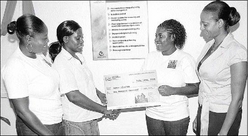UWI notebook: Epilepsy: The falling sickness
Published: Sunday | July 19, 2009
Epilepsy is one of the earliest recorded human diseases. In Jamaica and the Caribbean, epilepsy is sometimes viewed very negatively and persons with this condition are often ashamed and try to hide it, even from family, friends and physicians.
Epilepsy has many causes, says Dr Amza Ali, associate lecturer in neurology in the Faculty of Medical Sciences at the University of the West Indies, Mona. He said in lesser-developed countries, epilepsy is most commonly caused by infections of the brain. Fortunately, this is not so in Jamaica, where epilepsy is caused by strokes, brain injuries, high fevers in infancy and least commonly, inherited disorders, just as in developed countries. Dr Ali noted that epilepsy in Jamaica is more common than we think, because of the reluctance of many to disclose the condition to others.
Can be cured
He said that many people can be helped by medication, but un-fortunately, some people do not benefit from medications. Some of those who do not benefit from medication can have their condition controlled or even cured by surgery. Towards this end, Dr Ali has developed a close collaborative relationship with Yale University and the University of Tennessee in the United States of America where epilepsy surgery is regularly done.
To facilitate the development of epilepsy surgery in Jamaica for the Caribbean, Dr Ali has assembled a multi-disciplinary team at the University Hospital of the West Indies to carefully evaluate and select those patients who have not responded to medication and who might benefit from surgery. Once identified, patients will receive surgery, assisted by specialists from these American universities who will be involved with the project over the long term.
Erasing the stigma
Dr Ali noted that over the years, the Jamaican League Against Epilepsy (JLAE) together with the Jamaican Epilepsy Association (JEA) has worked to address the educational needs of patients and medical staff in understanding the disease and erasing the stigma associated with it. He says that the present initiative to develop a surgery programme for the region brings together many committed individuals who are determined to improve the lives of those who now have no other options.
Jamaica is poised to become one of few countries in this hemisphere with a comprehensive programme of care designed specifically to help persons with epilepsy.

President of Youth Empowered Through Service, Inspiration and Excellence (YETSIE), and second-year psychology student at UWI, Mona, Kay-Ann Henry (second left), presents a cheque, valued at $100,000, to Janet Bennett (2nd right), mother of Kemar Clayton, a teenager who was the victim of a motor vehicle accident, late last year, that has left him hospitalised. Sharing in the moment are Jenise Williams (left), YETSIE treasurer, and Michelle Lewis (right), lecturer in the Department of Sociology, Psychology and Social Work at UWI, Mona. YETSIE is a charity student group formed in partial fulfilment of the requirements of the course, Applied Group Dynamics.
The University of the West Indies (UWI), Mona, will host a conference on Food Security and Agricultural Development from July 28-30, on the campus.
The UWI, in keeping with its tradition of acting as a catalyst to address global, regional and local challenges, will explore the future of food security and agricultural development in the Americas with the aim of understanding the challenges and identifying possible solutions. The Americas, like many other regions around the world, face a number of challenges and uncertainties as it relates to food security and agricultural develop-ment. This includes, among other things, increasing prices for food products especially imported foods, rising production costs and increasing global competition as well as a disconnect between sellers (farmers) and buyers (retailers, wholesalers and consumers).
Challenges and opportunities
The conference is an opportunity for researchers and practitioners to discuss existing research and research in progress related to the current food security and agricultural development challenges and opportunities in the Americas. It is being hosted by the principal of the UWI, Mona, Professor Gordon Shirley.
The conference will bring together practitioners and researchers in the Americas - the Caribbean, Latin America, Central America and the United States of America as well as Canada - to discuss the challenges, strategies and solutions to food security and agricultural development issues at the policy and technical levels.
Dr Christopher Tufton, minister of agriculture and fisheries, will be the guest speaker at the opening ceremony beginning at 6 p.m.at Mona Visitors' Lodge and Conference Centre on July 28. The plenary speaker on Wednesday, July 29, will be Dr Dunstan Campbell, head, FAO Jamaica, Belize and The Bahamas, who will deliver an address entitled: Food Security - Fad or Trend. On Thursday, July 30, Dr Chelston Brathwaite, director general of the Inter-American Institute for Cooperation on Agriculture, will deliver the plenary address entitled: The Need for A New Development Model for the 21st Century.
The public is invited to attend. For further information visit the conference website at
www.mona.uwi.edu/conferences/2009/agriculturaldevelopment
